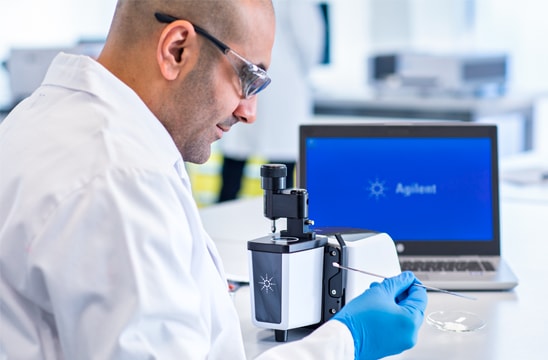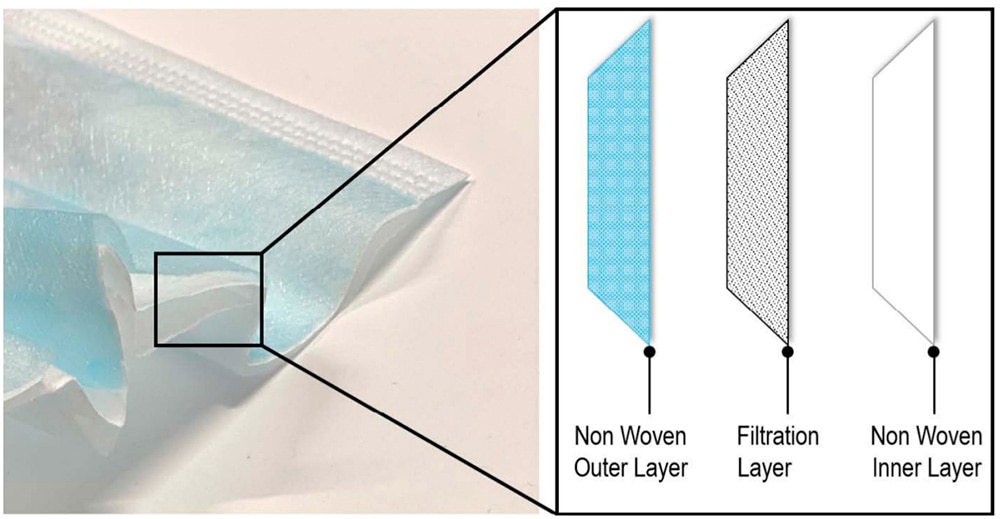
The use of personal protective equipment (PPE) and masks plays a critical role in prevention and control of the spread of certain respiratory infections. During the coronavirus disease (COVID-19) pandemic, the World Health Organization (WHO) released advice on the use of medical and nonmedical masks in the context of COVID-19.1
Medical masks have performance criteria that must be met according to international or national standards.2 However, there are no specific guidelines for nonmedical masks, which can be made from different combinations of woven and nonwoven fabrics.

The WHO describes several properties of nonmedical masks, such as the type of material, number of layers, shape, and fabric coating. Fourier transform infrared (FTIR) and laser direct infrared (LDIR) chemical imaging system can be used to identify mask material types, pore sizes, and the structure of layers in nonmedical masks.
Here we describe how Agilent FTIR and LDIR spectrometers can be used to analyze the properties of nonmedical masks.
FTIR quickly identifies material a mask is made from
FTIR spectroscopy provides a fast and nondestructive way to accurately identify and analyze mask materials. The compact Cary 630 FTIR, fitted with an attenuated total reflectance (ATR) sampling accessory, can quickly identify the type of material a mask is made from.
The method employed here uses simple spectrum-matching against an infrared library (Figure 1) and returns a list of matching material types. The ATR sampling accessory can measure a broad range of sample types, including liquids, solids, powders, semisolids, and pastes.
Agilent also offers a portable FTIR, the 4500 model, which is ideal for measurements in the field and uses the same method and technology as the benchtop Cary 630 FTIR.
LDIR provides high resolution chemical images of a multilayer nonmedical mask

(Left) Figure 1. A face mask being measured using the Cary 630 FTIR instrument fitted with a diamond ATR sampling accessory (upper). The results of matching of the sample spectrum against a spectrum library (lower). A list of library matches is presented together with the overlaid spectra.
The Agilent 8700 laser direct infrared (LDIR) chemical imaging system provides a sophisticated approach to chemical imaging and spectral analysis. The 8700 LDIR is a highly automated technique for obtaining high-definition chemical images of the constituents of a surface. The system offers a load-and-go approach that requires minimal user interaction.
In the example shown in Figure 2, the Agilent 8700 instrument was used to obtain a high-resolution chemical image of a multilayer nonmedical mask. A high-resolution chemical image of a 10×10 mm sample area was collected in under two minutes. Chemical information can be extracted from these high definition images, such as the structure of each layer and the pore sizes. In this example, the primary pore sizes of the outer layer were found to be between 750 to 800 µm (Figure 2A). Using high-magnification optics, irregularly shaped smaller pores with a diameter of ~20 µm were identified in this layer (Figure 2B).

Figure 2. Protective face masks typically have three layers of material, with the inner layer being that closest to the face.
The 8700 LDIR chemical imaging system provides a rapid way to determine material structure and thickness and can identify defects in nonmedical masks. In the example shown here, the 8700 LDIR identified the structure and the pore sizes of three layers in less than 1.5 minutes.

(Top) Figure 2A. Chemical image of three layers of a nonmedical mask (10×10 mm sample area), obtained with the Agilent 8700 (LDIR) system.
(Bottom)
Figure 2B. A section of the outer layer of a nonmedical mask (right, 200 µm), with a detailed image of one of the pores (left, 50 µm).
References
- World Health Organization, Interim Guidance, Advice on the use of masks in the context of COVID-19, June 2020, https://apps.who.int/iris/rest/bitstreams/1279750/retrieve
Accessed July 2020 - ASTM International, Standard Specification for Performance of Materials Used in Medical Face Masks, ASTM F2100-19e1, Book of Standards, Vol 11.03